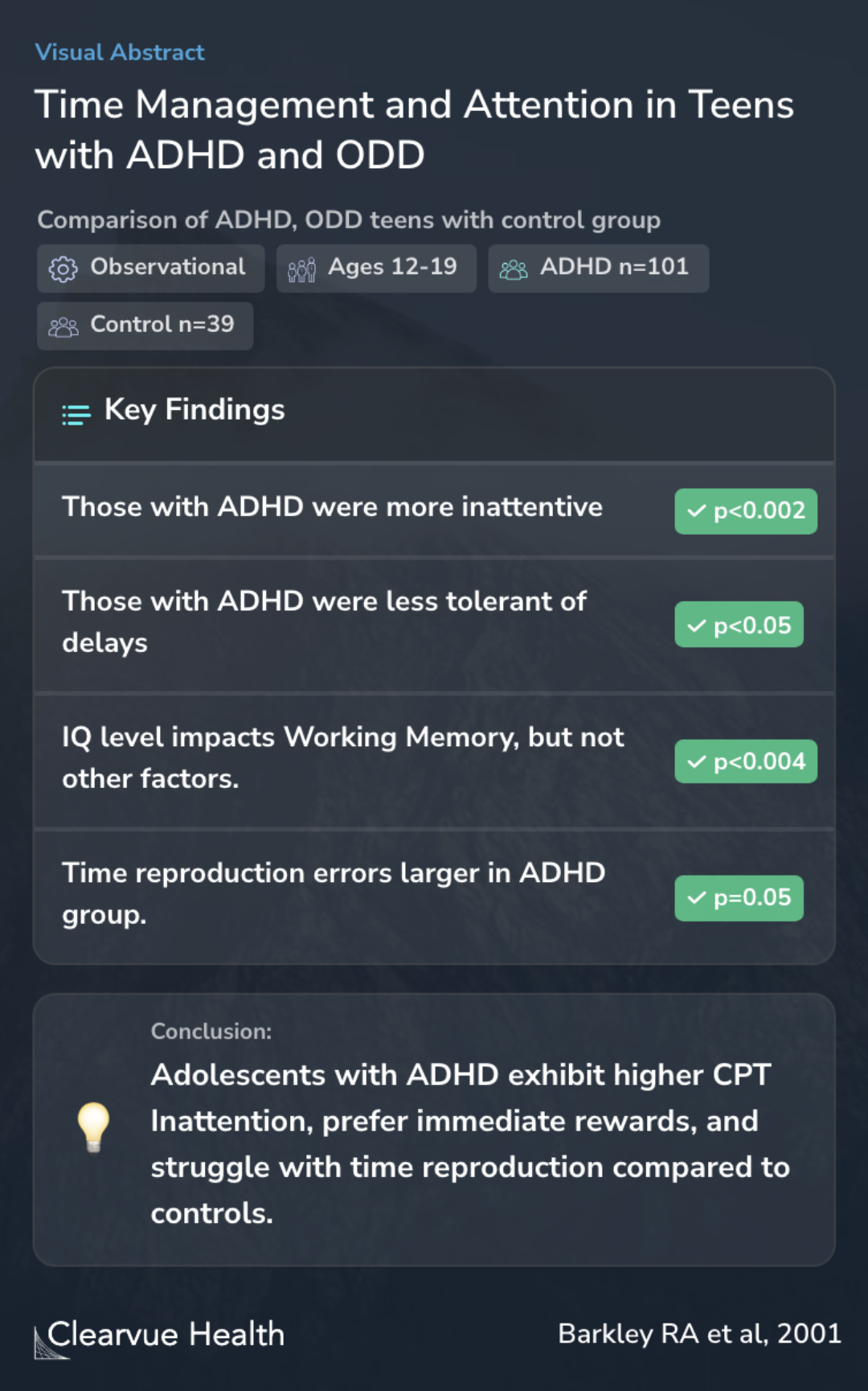Executive functioning, temporal discounting, and sense of time in adolescents with attention deficit hyperactivity disorder (ADHD) and oppositional defiant disorder (ODD)
Time Management and Attention in Teens with ADHD and ODD
Barkley RA, Edwards G, Laneri M, Fletcher K, Metevia L

Objectives
This study focused on understanding the cognitive and behavioral differences in adolescents with Attention-Deficit/Hyperactivity Disorder (ADHD) and Oppositional Defiant Disorder (ODD) as compared to their peers. Specifically, it aimed to assess executive function, temporal reward discounting, time estimation, and time reproduction in clinic-referred teens (ages 12-19) with ADHD and ODD. The study included a control group of community control (CC) teens, matched for age and sex, to provide a comparative perspective. A key element of the study involved reducing the executive functioning measures into three distinct dimensions: CPF Inattention, Working Memory, and CPT Inhibition.
Clinic-referred teens (ages 12-19) with ADHD and ODD (N = 101) were compared to community control (CC) teens, equated for age and sex, (N = 39) on a variety of psychological tasks assessing executive functioning (EF), temporal reward discounting, and time estimation and reproduction. A f...
Methods
The methodology involved observing and comparing a group of teenagers diagnosed with ADHD (101 participants) and a control group (39 participants).
Results indicated that the ADHD group had significantly more CPT Inattention than the CC group. No differences were found for Working Memory or CPT Inhibition. The ADHD group displayed significantly greater temporal discounting of delayed hypothetical monetary rewards relative to immedia...
Results
The study results revealed that the ADHD group exhibited significantly more inattention than the control group. However, there were no significant differences in Working Memory or CPT Inhibition between the two groups. Interestingly, the ADHD group displayed a greater tendency for temporal discounting, preferring immediate monetary rewards over delayed ones, and showed more challenges in time reproduction. Levels of comorbid oppositional defiant disorder, delinquency, or anxiety/depression did not influence these differences. The findings indicate that while some common traits associated with ADHD, such as issues with working memory and inhibition, were not observed in this adolescent group, other characteristics like CPT Inattention and temporal discounting were prominent.
Results indicated that the ADHD group had significantly more CPT Inattention than the CC group. No differences were found for Working Memory or CPT Inhibition. The ADHD group displayed significantly greater temporal discounting of delayed hypothetical monetary rewards relative to immedia...
Conclusions
The conclusions drawn from the study suggest that adolescents with ADHD exhibit higher levels of CPT Inattention, a preference for immediate rewards, and struggle with time reproduction compared to their control counterparts. This aligns with past research on executive function and the sense of time in children with ADHD, extending these findings to the adolescent age group. The visual abstract below encapsulates these findings:
Interestingly, problems with working memory and inhibition found in previous studies of children with ADHD were not evident in this study. This could be due to age-related improvements or the tasks not being challenging enough to elicit these issues.
Results are reasonably consistent with past research on EF and sense of time in children with ADHD and extend these findings to the adolescent age group. Problems with working memory and CPT inhibition found in prior studies of children with ADHD, however, were not evident here, perhaps ...
Key Takeaways
Context
The broader context of this study is crucial for understanding its implications. ADHD has been closely linked to challenges in executive function, which include difficulties with self-control, planning, and working memory. These findings are consistent with the wider body of research on ADHD, as demonstrated in the summary below:
Additionally, the concept of delay discounting in ADHD has been explored in previous research, such as the study by Wilson et al. in 2011. This study also found that children with ADHD were less tolerant of delays in rewards, choosing smaller rewards that were available sooner. This emphasizes that ADHD may be connected to the ability to delay gratification, as shown in the following summary:
Together, these pieces of research, along with the current study, highlight the complex nature of ADHD and its effects on executive function and reward processing.